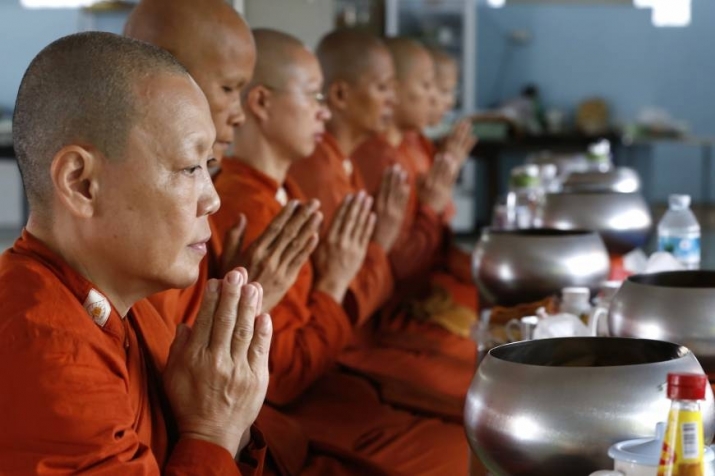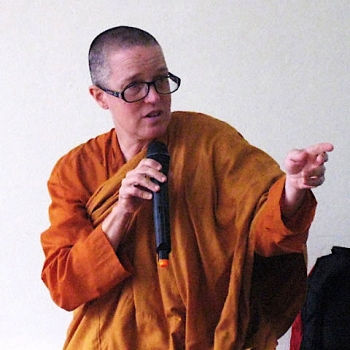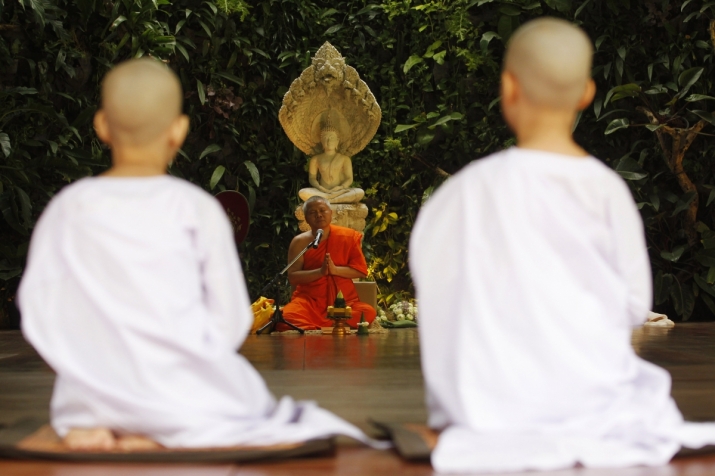NEWS
American Bhikkhuni’s Campaign for Female Ordination in Thailand Met with Threats, Arson
By Craig Lewis
Buddhistdoor Global
| 2017-06-05 |  Female Buddhist monks in Nakhon Pathom, Thailand, in 2015. From japantimes.co.jp
Female Buddhist monks in Nakhon Pathom, Thailand, in 2015. From japantimes.co.jpHighlighting the ongoing struggle of Buddhist women in many societies across Southeast Asia to find acceptance in their bid to lead monastic lives, Bhikkhuni Dr. Lee, an American nun in the Theravada tradition originally from New York (her lay name is Leaura Naomi) recently spoke on the lengths to which she must go, and the very real dangers she faces, in standing up for her beliefs and her fight for monastic gender equality in Thailand. These obstacles include threats of kidnap, arson attacks, and a confrontation earlier this year that ended with her being rescued by the US embassy in Bangkok.
Bhikkhuni Dr. Lee’s struggle is symptomatic of a broader perception in many societies that full ordination is the exclusive domain male monastics. Yet she is only one of a number of notable, determined figures who are committed to overturning the entrenched and institutionalized chauvinism that stands in the way of female monasticism and the re-establishment of the fourfold sangha* envisioned by Shakyamuni Buddha as the optimal holistic and inclusive structure for all segments of society to study and share the Dhamma. According to historians, bhikkhunis flourished for 1,000 years in India and Sri Lanka, but the spread of Islam and the impact of various conflicts caused them to almost disappear. In Thailand, a proclamation by the kingdom’s Buddhist Sangha Supreme Council in 1928 expressly forbade female ordination. Instead, women in the country may only become white-robed nuns, known as maechi, who receive much lower respect and recognition from society at large, and hold a rank similar to that of a novice monk.
 Bhikkhuni Dr. Lee. From saranaloka.org
Bhikkhuni Dr. Lee. From saranaloka.orgBhikkhuni Dr. Lee, founder of the International Women’s Meditation Center Foundation in Thailand and co-founder (along with Bhikkhuni Rattanavali), of the respected Outstanding Women in Buddhism Award, is no stranger to the perils of her refusal to bow to convention. “In Thailand, there have been four kidnapping attempts on my life,” she said. (Asia Times)
Indeed, she credits a US embassy official with saving her life earlier this year when a gang surrounded her temple, and the official was instrumental in arranging for local police to intervene. She added that just 10 days later, the dormitory where she lived with four Thai women was set ablaze.
“I built a temple three times in Thailand; we got shut down two times and the third time we were arsoned,” Bhikkhuni Dr. Lee recounted, noting that a gang of Thai men continues to threaten her and her community in the coastal province of Rayong, on Thailand’s eastern seaboard some 144 kilometers from Bangkok. (Asia Times)
The attacks first began in 2016, said Bhikkhuni Dr. Lee, recalling eight drunken men shouting: “We want the bhikkhuni out of the village. We want the American out of the village. If you don’t get out of the village, we’re going to burn your temple down.” (Asia Times)
"We are perplexed and are having a hard time interpreting the incident. I don’t think it came from the village level because everything was going along smoothly for eight years, so why all of a sudden?” said Bhikkhuni Dr. Lee said at the time. She noted that oppression and violence toward female clergy had been reported across Thailand, often fueled by opposition from male monastics. “[In 2015] they taught that you can’t ordain women. They teach at the local temples that bhikkhunis are wrong. So part of the problem is bhikkhus are perpetuating the violence,” (Bangkok Post)
Yet despite the ongoing threats, Bhikkhuni Dr. Lee continues to run the International Women’s Meditation Center Foundation, which works toward gender equality in Buddhism, winning government recognition in 2010. The center offers meditation and Buddhist practice classes for women and girls, Dharma teachings for women and girls, post-graduate education for bhikkhunis, and IT and media services for female Dharma teachers.
 Novice nuns (maechi) at a meditation center in Bangkok. Photo by Sukree Sukplang. From atimes.com
Novice nuns (maechi) at a meditation center in Bangkok. Photo by Sukree Sukplang. From atimes.comWhile predominantly a Theravada Buddhist country—93.2 per cent of Thailand’s population of 69 million identify as Buddhists, according to data for 2010 from the Washington, DC-based Pew Research Center—Thailand has never officially recognized the full monastic ordination of women. Despite this official opposition, communities of female renunciants do exist, some of whom have been ordained overseas, but they do not enjoy the same level of societal acceptance as their male counterparts. By comparison, the Mahayana branch of Buddhism more common in East Asia has historically been much more accepting of the ordination of women.
* The fourfold sangha: bhikkhus (male monastics), bhikkhunis (female monastics), upasakas (male lay followers), and upasikas (female lay followers.)
See more
Liberation struggle for Thai Buddhist nuns (Asia Times)
Female monks blame sexism for burning down of temple dormitory in Rayong (Bangkok Post)
International Women’s Meditation Center Foundation
Outstanding Women in Buddhism Award Recipients (International Women’s Meditation Center Foundation)
Related news from Buddhistdoor Global
Buddhist New Year: Celebrating by Temporary Ordination in Myanmar
Female Monastics in Thailand Barred From Paying Respects to Late King
Outstanding Buddhist Women Award Ceremony Held in Taiwan
His Holiness the 17th Karmapa to Empower Female Buddhists with Monastic College
The Thai Bhikkhuni Order: From One to One Hundred and More to Come
Related features from Buddhistdoor Global
Nuns in the Tibetan Tradition: Latest Developments and Future Prospects
Anukampa Bhikkhuni Project: Nuns’ Monastery Set to Become Reality
The Buddhist Stance on Theravada Women’s Issues: A Conversation on Gender Equality and Ethics with Ajahn Brahmali
Offering Welcome: Ayya Tathaloka
Life in the Red – The Long Journey to Really Being Daughters of the Buddha


















